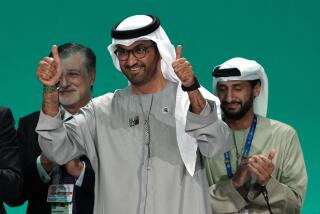Oil Prices Erratic After Mixed Reports on Progress of OPEC Quota Talks
- Share via
VIENNA — World oil prices fluctuated sharply Tuesday on conflicting news from the meeting here of the Organization of Petroleum Exporting Countries.
By evening, however, it was clear that Iran and Iraq were continuing to disagree over oil-production quotas--a dispute that has caused increased oil pumping and has led to the slump in world crude prices.
Offhand remarks during the day--variously regarded as optimistic and pessimistic--caused traders to buy and sell oil futures. The transactions took place within moments of statements made in the lobby of the Hotel Marriott here, where many of the OPEC delegations stay and conduct informal talks.
“I’ll bet some oil traders made or lost a year’s profit today,” one American industry analyst said.
Early Tuesday, during a round of individual meetings in Vienna hotel rooms, Iran’s oil minister, Gholamreza Aghazadeh, told reporters: “I think we can reach agreement.”
Then OPEC President Rilwanu Lukman, the Nigerian oil minister, insisted that the cartel’s meeting would “not end without an agreement.”
Buoyed by such remarks, the oil market rose markedly. The January contract for West Texas Intermediate crude, for instance, soared $1.42 a barrel to $14.40 on the New York Mercantile Exchange.
Later, the Iraqi oil minister, Issam Abdul-Rahim Chalabi, heading for another meeting, declared: “We are working on an agreement involving all 13 members that will solve all our problems.”
Finally, Aghazadeh said nothing had been firmly decided, despite six days of talks at OPEC headquarters here, and a senior member of one OPEC delegation, who asked not to be identified by name, said: “There has been no progress.”
That change of tone caused the oil markets to reverse direction. West Texas Intermediate fell back, ending the day at $13.86, up 88 cents from where it had started.
Aghazadeh said his government was refusing to accept a production quota equal to Iraq’s. However, he appeared not to object to other nations giving up some of their share of production to Iraq, which might break the deadlock.
For two years, Iraq has been OPEC’s odd man out, refusing to abide by its assigned quota--thus spurring higher pumping by other OPEC members, leading to the current oil glut and lower prices.
Throughout the day, various ministers sought a formula acceptable to Iran and Iraq, while keeping production at a level that would raise prices above the current $10 for benchmark Dubai crude.
Iraq has insisted that its official quota, which is 60% lower than Iran’s, be raised to parity with its adversary in the eight-year-long Persian Gulf war that was halted by a cease-fire in August.
Iran has staunchly resisted sharing production rates with its bitter enemy. Both countries want to pump large amounts of oil to help them recover from the economic costs of the war.
Various formulas have been suggested that involve raising Iraq’s quota almost to Iran’s. The difference in the figures would then be made up to Iraq by other oil-producing states of the gulf region.
This scenario would allow Iran to claim that its quota remains higher than Iraq’s while permitting Iraq to pump more oil, which Baghdad intends to do anyway.
Industry experts suggest that if OPEC’s official total quota were raised from the current 16.5 million barrels a day--when actual production is over 21 million barrels--to somewhere around 18.5 barrels, the price might be raised and stabilized.
At the same time, those levels of production and the resulting higher prices might satisfy Iranian and Iraqi economic concerns--and, more importantly, national pride.
More to Read
Sign up for Essential California
The most important California stories and recommendations in your inbox every morning.
You may occasionally receive promotional content from the Los Angeles Times.










